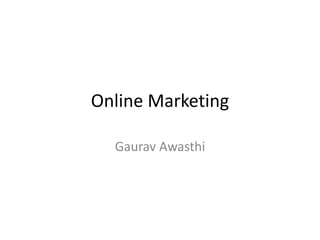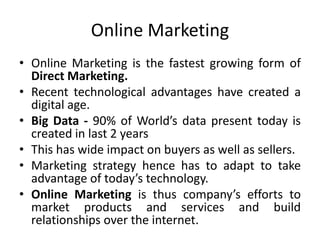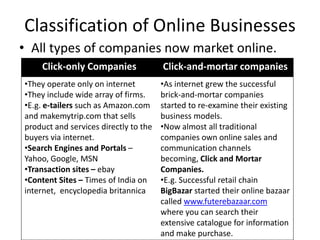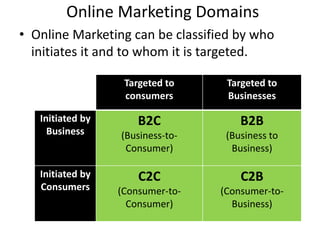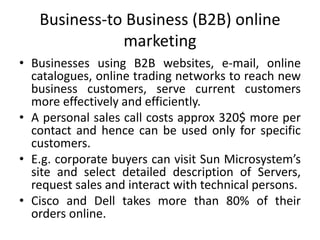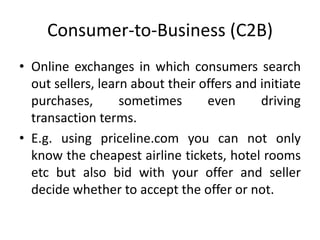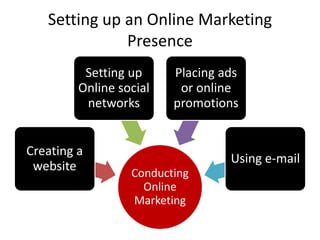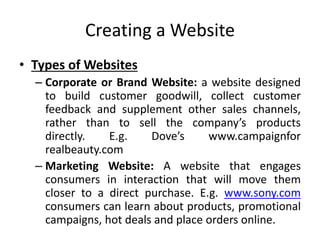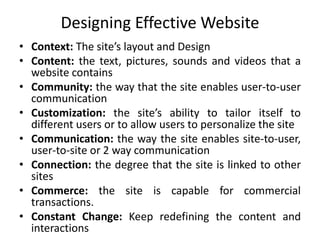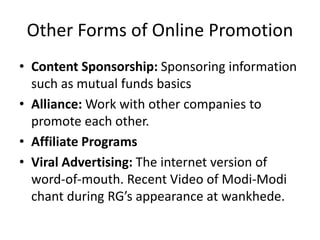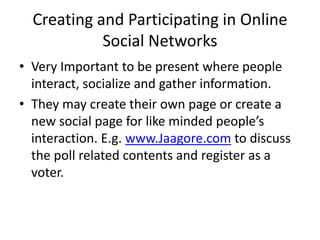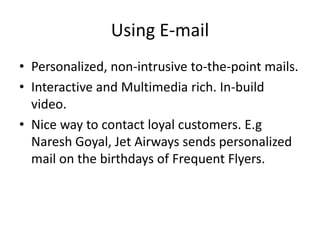Online marketing
- 2. Online Marketing • Online Marketing is the fastest growing form of Direct Marketing. • Recent technological advantages have created a digital age. • Big Data - 90% of World’s data present today is created in last 2 years • This has wide impact on buyers as well as sellers. • Marketing strategy hence has to adapt to take advantage of today’s technology. • Online Marketing is thus company’s efforts to market products and services and build relationships over the internet.
- 3. Marketing and Internet • Consumers spend 100 billion dollars everyday Online! • Internet is a vast public web of computer networks, connecting people all across the world and has large information repository. • Internet Penetration has already crossed 2 Crore households in India. • The web has dramatically changed consumer’s notions of convenience, speed, price, product information and services. • As a result, it has given marketers a whole new way to create value and build relationships with the customers.
- 4. Classification of Online Businesses • All types of companies now market online. Click-only Companies Click-and-mortar companies •They operate only on internet •They include wide array of firms. •E.g. e-tailers such as Amazon.com and makemytrip.com that sells product and services directly to the buyers via internet. •Search Engines and Portals – Yahoo, Google, MSN •Transaction sites – ebay •Content Sites – Times of India on internet, encyclopedia britannica •As internet grew the successful brick-and-mortar companies started to re-examine their existing business models. •Now almost all traditional companies own online sales and communication channels becoming, Click and Mortar Companies. •E.g. Successful retail chain BigBazar started their online bazaar called www.futerebazaar.com where you can search their extensive catalogue for information and make purchase.
- 5. Online Marketing Domains • Online Marketing can be classified by who initiates it and to whom it is targeted. Targeted to consumers Targeted to Businesses Initiated by Business B2C (Business-to- Consumer) B2B (Business to Business) Initiated by Consumers C2C (Consumer-to- Consumer) C2B (Consumer-to- Business)
- 6. Business-to-Consumers (B2C) • B2C – business selling goods and services to final consumers has garnered the most attention by popular press. • People buy rail tickets from irctc.co.in, books and gadgets from flipkart.com, clothing from futurebazaar.com similarly almost everything online these days. • Still, internet consumers differ from traditional offline one in their approaches to buying(self initiated) and response to marketing ( more personalized). • Hence companies interact more personally with consumers and offer wide array of options. E.g. irctc has recently started selling apparels, gadgets etc also in addition to ticket and hotel booking sales.
- 7. Business-to Business (B2B) online marketing • Businesses using B2B websites, e-mail, online catalogues, online trading networks to reach new business customers, serve current customers more effectively and efficiently. • A personal sales call costs approx 320$ more per contact and hence can be used only for specific customers. • E.g. corporate buyers can visit Sun Microsystem’s site and select detailed description of Servers, request sales and interact with technical persons. • Cisco and Dell takes more than 80% of their orders online.
- 8. Consumer-to-consumer (C2C) Online Marketing • Online exchange of Goods and services between final consumers. • E.g. Ebay.com online auction and trading, olx.com etc. • C2C means online buyers not only consume prod and information they also create it. • Marketers are also targeting approx 15 million active bloggers read by 57 million people everyday. • Tripadvisor.com offers reviews of hotels and destinations by certified felloe travelers and users in turn contribute themselves also.
- 9. Consumer-to-Business (C2B) • Online exchanges in which consumers search out sellers, learn about their offers and initiate purchases, sometimes even driving transaction terms. • E.g. using priceline.com you can not only know the cheapest airline tickets, hotel rooms etc but also bid with your offer and seller decide whether to accept the offer or not.
- 10. Setting up an Online Marketing Presence Conducting Online Marketing Creating a website Setting up Online social networks Placing ads or online promotions Using e-mail
- 11. Creating a Website • Types of Websites – Corporate or Brand Website: a website designed to build customer goodwill, collect customer feedback and supplement other sales channels, rather than to sell the company’s products directly. E.g. Dove’s www.campaignfor realbeauty.com – Marketing Website: A website that engages consumers in interaction that will move them closer to a direct purchase. E.g. www.sony.com consumers can learn about products, promotional campaigns, hot deals and place orders online.
- 12. Designing Effective Website • Context: The site’s layout and Design • Content: the text, pictures, sounds and videos that a website contains • Community: the way that the site enables user-to-user communication • Customization: the site’s ability to tailor itself to different users or to allow users to personalize the site • Communication: the way the site enables site-to-user, user-to-site or 2 way communication • Connection: the degree that the site is linked to other sites • Commerce: the site is capable for commercial transactions. • Constant Change: Keep redefining the content and interactions
- 13. Placing Ads and Promotions Online • Forms of Online Advertising: – Most common form is Banners found anywhere on the page. E.g. if you are looking for cheap air tickets the banner for cheap hotel rooms may appear. – Interstitials are display ads that appear while screen change. – Pop-ups are online ads that appear suddenly in a new window. – Rich Multimedia Ads which incorporates animation, video, sound and interactivity – Search Related Ads comes on top of search window. E.g Google Ad-words program
- 14. Other Forms of Online Promotion • Content Sponsorship: Sponsoring information such as mutual funds basics • Alliance: Work with other companies to promote each other. • Affiliate Programs • Viral Advertising: The internet version of word-of-mouth. Recent Video of Modi-Modi chant during RG’s appearance at wankhede.
- 15. Creating and Participating in Online Social Networks • Very Important to be present where people interact, socialize and gather information. • They may create their own page or create a new social page for like minded people’s interaction. E.g. www.Jaagore.com to discuss the poll related contents and register as a voter.
- 16. Using E-mail • Personalized, non-intrusive to-the-point mails. • Interactive and Multimedia rich. In-build video. • Nice way to contact loyal customers. E.g Naresh Goyal, Jet Airways sends personalized mail on the birthdays of Frequent Flyers.
